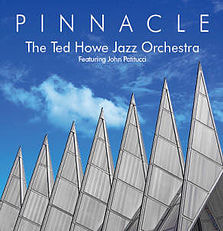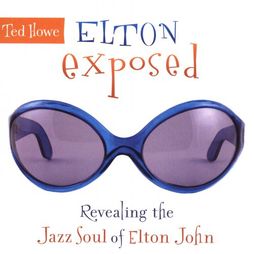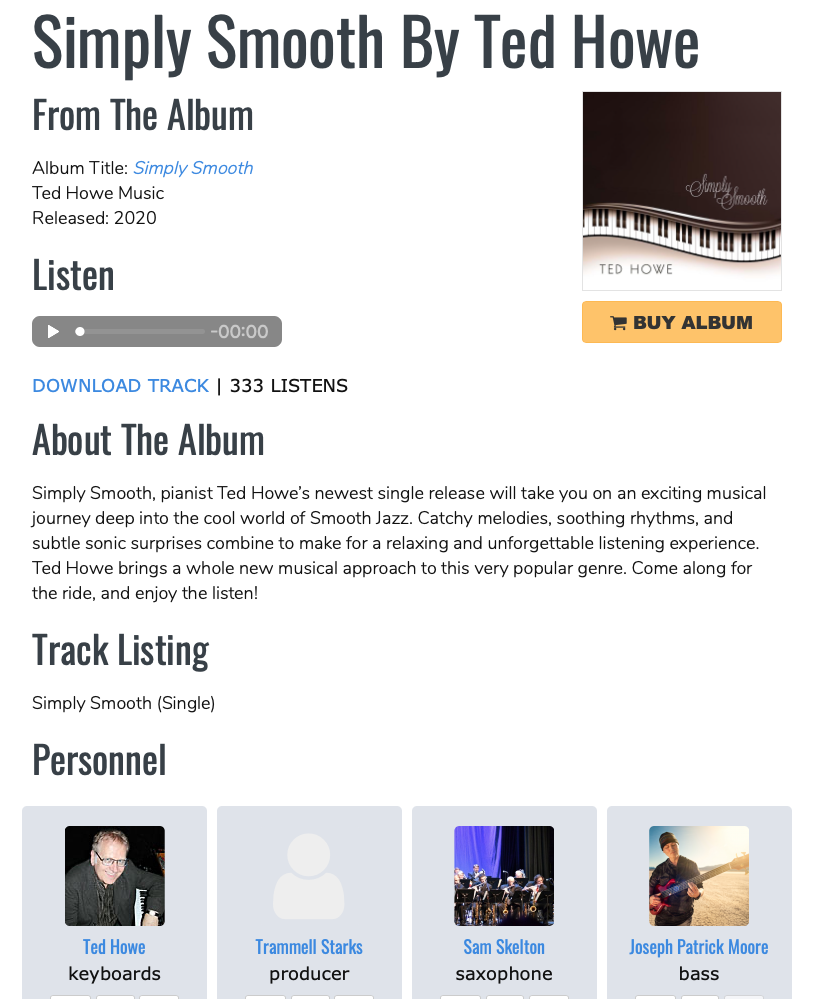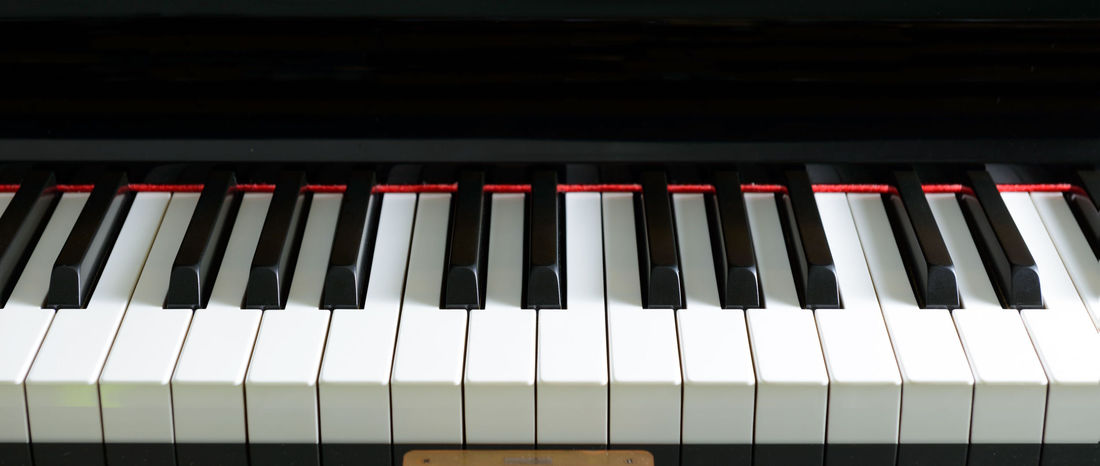|
All About Jazz selects Ted Howe's song "Simply Smooth" as the track of the day and is offering the song as a free download. Click for more info.
The new TedHowe.com website has launched (version 2.0). Check out all of the addition's and also follow Ted on his Social Media accounts. Sign-Up on the Newsletter mailing list to keep up-to-date.
 Pianist Ted Howe offered up one of the finest of Duke Ellington tributes, the piano trio set titled simply Ellington (Summit Records, 2005). It was a heartfelt ride through some of The Duke's most familiar tunes, swinging mightily. He now steps up into Ellington-ian ensemble territory with Pinnacle, by his thirteen piece Ted Howe Jazz Orchestra. In the old "is it classical, is it jazz?" discussion, Pinnacledefinitely leans classical—but it does swing. Opening with "Presto for Two Trombones," Howe's arrangement sounds less like Ellington and more like those of trombonist J.J.Johnson on his work with trumpeter Dizzy Gillespie on Perceptions (Verve, 1961), brassy and magisterial before it breaks into a deep groove. Trombonists Andy Martin and Francisco Torres rip it up on their solos, and bassist John Patitucci sears his solo while his rhythm mates, guitarist Dan Baraszu and keyboardist Geoff Haydon, give the piece a ringing modernity, with a Latin tinge injected by percussionist Jose "Bam Bam" Ramirez. "Impromptu for Trumpet" is another grand, sweeping statement, a showcase for horn man Lester Walker, who plays a beautiful lead around the harmonic gusts of the orchestra. Howe centerpieces the CD with "Suite #1 for Jazz Orchestra." The piece is comprised of three six minute movement: "Movement 1" an airy landscape that brightens out of a gray murk like a sunrise, with electric undercurrents from guitar and rhodes keyboard. "Movement 2" contains some of set's most gorgeous harmonies, one of Ellington's greatest strengths, and we could mention Maria Schneider in this context, too, for comparison—working, again, a light/dark dynamic. Ellington is evoked on "Movement 3," with trumpeter Lester Walker coming to the front again, growling around a Cotton Club plunger mute. Swing is king here, with drummer Marlon Patton's muscularity driving the music forward. A beautiful, masterfully constructed and arranged suite. The eleven minute "Adagio for Piano" gives pianist Ted Howe a chance to step out on his instrument, with a spare, melancholy solo intro, two minutes of ruminative beauty, joined then by a gentle burst of bass and drums, followed by the orchestra's sound seeping up out of the flooring to create a resplendent, sweeping panorama, an ebb and flow of brass and reeds shot through with Howe's inspired pianism. The closer, "Jazz Etude for Three Clarinets" brings back an Ellington mood, with jungle drums pounding behind the wailing, snaky reeds, an exciting and upbeat wrap-up for an extraordinary orchestra jazz set.
- Dan McClenaghan c/o All About Jazz  Big bands come at the listener from a variety of angles these days, some more aslant than others. On Pinnnacle, Los Angeles-based composer / arranger / pianist Ted Howe covers all the bases, navigating his thirteen-piece orchestra through styles ranging from swing to funk, Latin to tone poem, often with classical undertones. Howe gives credit for his eclectic approach to the late Herb Pomeroy, with whom he studied at the Berklee College of Music in Boston and afterward by late- night telephone after Howe ended his tenure as an instructor at Berklee and moved to Atlanta, GA. Among other things, Pomeroy was a Duke Ellington enthusiast and scholar, and Howe writes that the three-movement Suite #1 for Jazz Orchestra, whose aesthetic is at the heart of this admirable session, was inspired by the many suites composed by Ellington for his orchestra. Howe began work on the Suite in 1981 and has revised and modified it over the years. The other four numbers on Pinnacle, also influenced by Pomeroy (to whose memory the album is dedicated), were written in 2011- 12. They include the red-hot opener, "Presto for Two Trombones," which showcases to of the L.A. area's most acclaimed 'bone masters, Andy Martin and Francisco Torres, with another splendid solo by bassist John Patitucci. "Presto" is followed by the debonair "Impromptu for Trumpet," featuring Lester Walker whose eloquent horn engrafts precisely the proper warmth and spirit. Walker solos again, this time muted, on the last of the eighteen-minute Suite's movements, a powerful flag-waver whose sturdy underpinnings are supervised by Patitucci and drummer Marlon Patton. The rhythm section introduces the first movement, whose funky rhythms provide a sturdy bridge to the second, a more subtle vehicle for horns, winds and rhythm underscored by Geoff Haydon's Fender Rhodes. Howe's tasteful piano is front and center on the enchanting eleven-minute "Adagio for Piano," Patitucci's resonant bass and Sam Skelton's animated clarinets on the closing "Jazz Etude for Three Clarinets." Howe's orchestra traverses a sizable expanse of musical ground, most of which is well worth canvassing. His compositions and arrangements are never less than engaging, the orchestra itself sound in every respect. In short, a first-rate album replete with pleasant surprises.
- Jack Bowers When I received my copy of Pinnacle featuring the music of the Ted Howe Orchestra, it brought back many happy memories of the Herb Pomeroy Big Band. “Pinnacle, Ted Howe's newest CD, features his 13 piece jazz orchestra and showcases five original extended pieces composed and arranged by Howe. With its beautiful melodies, rich textures, high energy, and virtuosic performances, this recording is intense and exciting while remaining highly accessible. Howe is a Los Angeles-based pianist, composer, arranger, producer, and teacher. Pinnacle is his seventh CD as a leader and showcases his strength as a melodist and his broad knowledge and command of many diverse musical traditions. Howe's approach to arranging was greatly influenced by the late Herb Pomeroy, the well-respected trumpet player, arranger, and eminent jazz music educator at Boston's renowned Berklee College of Music. Pomeroy, Howe's friend and teacher, developed a method of arranging now widely known as "Herbie's Line Writing Course” that was inspired by his love of Duke Ellington's music and arranging techniques. (Herb never stopped studying The Duke's music.) Howe's compositions touch on a wide range of styles, including swing, funk, and Latin, among others. The many time signature changes catch the listener by pleasant surprise. Howe's harmonization technique employs more of a horizontal, linear approach commonly used in classical music. His horn voicings and subtle use of dissonance create mysterious overtones that make his 13 piece ensemble sound as big as an 18-20 piece big band, but with far fewer musicians. Like Ellington, who adapted classical music forms and techniques to jazz and wrote many extended compositions and "suites," Howe includes on this release a jazz suite with three distinct movements. There are also four other pieces that closely hew to the classical paradigm, all providing the space for these superb musicians to express themselves within the framework of these challenging compositions. According to Howe, "These pieces aren't just about the music; they're also about the instruments, the varied combinations of sound they make, and how great musicians can rise to just about any challenge and take the music to new and exciting places. Take, for example, the opening piece, "Presto for Two Trombones” which features Los Angeles trombonists Andy Martin and Francisco Torres. This is a very challenging piece for slide trombone players, especially the solo section, where these two virtuosos rip through the very fast modal section. The inimitable John Patitucci also adds some heat to this piece with his own lightning fast solo. Howe cites Chris Botti as the inspiration for "Impromptu for Trumpet," a sweetly melodic number that belies the tune's difficult chord changes. Lester Walker's beautiful interpretation deftly rises to the challenge. The core of this project is the "Suite #1 for Jazz Orchestra." This piece premiered in 2011 at the Conant Arts Center in Oglethorpe University in Atlanta, GA. The three movements are based solely on a single four- bar motif using many of the time signatures, styles and instruments usually used in jazz. Howe showcases his own playing in the lovely "Adagio for Piano." His touch is light and graceful on this piece, the second of the only two numbers which he plays on in this project. The final work on this disc is "Jazz Etude for Three Clarinets," featuring solos by Sam Skelton on Eb clarinet, and John Patitucci on bass. This intriguing piece is characterized by the frequent use of diminished chords which create tension and an interesting, intense display of dissonance. Currently based in Los Angeles, Howe lived in Atlanta for many years. He has performed with and/or produced for many well-known artists, including Mel Torme, Lainie Kazan, Cherly Bentyne (of the Manhattan Transfer), Dave Weckl, Joe LaBarbera, and Tom Kennedy, among others. He travels around the country performing his two very popular shows, "An Evening of Duke Ellington," and "Shaken Not Stirred: The Music of James Bond. Howe has also produced three other well-reviewed CDs as a leader on the Summit Records label, "Ellington," "Love Song," and "Elton Exposed," which became a big hit on the official Elton John Fan Club web site -- a rarity for any jazz CD! Pinnacle is a marvelous work from a mature artist who clearly has an ear for beautiful melodies and great respect for and knowledge of musical traditions. This CD will certainly expose Howe's achievements and talents as a musician and composer to a much wider audience, which he so richly deserves.
Jazz pianist/arranger Ted Howe’s 2005 Ellington and 2006 Elton John, Elton Exposed releases, garnered positive reviews and accelerated his stature within jazz circles. With this newly issued endeavor, the pianist prophesizes the Arlen, Porter and Van Heusen songbooks, where love is the first order of the day. Howe’s penetrating and sharply focused performances once again convey the steadfast commitment he injects into his respective projects. On this effort, Howe employs famed vocalists, Lainie Kazan and Giacomo Gates. And his piece titled, Ill Remember Your Smile, is a sterling gem, where Gates imparts a mark of authenticity via his understated lyricism, wondrously contrasted by an memorably melodic hook. As Howe’s compositions seamlessly intertwine with standards such as Cole Porter’s True Love, and James Van Heusen’s, Moonlight Becomes You. Enamored by a sparkling production featuring a standard rhythm section, strings, percussion and a french horn, the pianist professes love with a ritualistic mindset sans the customary sweeteners. Simply stated, Howe avoids muzak-like clichés here. And its all executed with finesse and eloquent vibes, all imprinted with a perceptible touch of “class.“
By Glenn Astarita No one reworks the harmonic patterns of standards with the imagination of pianist Ted Howe. Thanks to his arranger’s ear, gems like “Let’s Do It” and “Come Rain or Come Shine” boast voicings that often find bassist Chris Colangelo harmonizing below Howe’s left hand, playing unexpected root tones that often have a noir effect. But before the accent is put on the wrong chops, be assured that Howe is a triple threat: His keyboard technique underscores an insight that thrives on postbop fluidity. Then there are the songs he co-wrote with lyricist Rebekah Miller, particularly “If I Had Known” and the title track. They’re both interpreted by Lainie Kazan, who has evolved into one of the most poignant cabaret singers around. She negotiates the tricky key changes in the bridge of “If I Had Known” with deceptive ease. Another vocalist on the session, Giacomo Gates, shines with his unique scatting on “Come Rain or Come Shine.” Bassist Jim DeJulio steals the limelight in the longest track, “All the Way,” which shifts from a rubato 4/4 to 3-against-4 to an intense jazz waltz with the help of sensitively swinging brushwork from Matt Slocum. During an extended cadenza, aided by overdubbing, DeJulio manages to quote from “Love and Marriage,” “Call Me Irresponsible” and “Darn That Dream.” Of course, Howe—no slouch when it comes to interpolating—does so on “Moonlight Becomes You,” another example of his distinctly re-harmonized doubling of piano and bass lines (this time with DeJulio). He must have had Jimmy Van Heusen’s melody in mind when he referred to it in the middle of Cole Porter’s “Let’s Do It.”
- Harvey Siders  Ted Howe is a pianist, arranger, bandleader and educator who has taught at Berklee in Boston and played in the Atlanta Symphony Orchestra's summer pops series. He is also something that, based on the relative scarcity of Elton John covers, would seem to be uncommon among jazz musicians: an Elton John fan. Howe's commitment to quality on this project is apparent in his choice of sidemen (John Patitucci and Joe LaBarbera) and engineer (Matt Still), and also in his thorough, meticulous, varied piano-trio arrangements for 10 Elton John songs. His two stated goals are to respect John's music and to make it into genuine jazz. He succeeds at both. It is intriguing to hear Patitucci sing "Border Song" in his dark bass language. Howe's elegant piano makes "Blue Eyes" sound like it has been a staple of the jazz book since Teddy Wilson. The best track is "Your Song." It begins as a moody reflection, then kicks hard into time, then ends in another free meditation on the famous melody.
It is all so much fun? A second volume is in order. - Thomas Conrad |
Categories
All
Archives
May 2021
|
|
Media
|
Services
|
Live
|
Store
|
© 2000 - 2023 Ted Howe | All rights reserved







 RSS Feed
RSS Feed